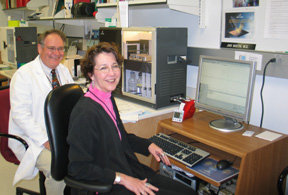 |
Jody Booth, foreground, technical director, UNMC Molecular Interaction Facility, and Donald Johnson, Ph.D., UNMC Department of Pathology and Microbiology, with the BIAcore 3000, a system they say can provide researchers more sophisticated information and faster answers to some of their lab work. |
As part of the most recent settlement, UNMC bought a $400,000 BIAcore 3000 instrument to serve researchers at UNMC and beyond.
Donald Johnson, Ph.D., associate professor, UNMC Department of Pathology and Microbiology, said the BIAcore instrument is mostly being used in biomedical companies with interests in biotechnology. “The BIAcore is like the Maserati of instruments, except it’s made in Sweden,” Dr. Johnson said. “Nebraska is one of the few states using tobacco settlement money for health care and biomedical research.
Getting answers on how molecules interact has been a real challenge for scientists, Dr. Johnson said. “It’s a dynamic that’s hard to measure,” he said. “In the last five years, this machine has advanced technology for developing new therapies that previously were done manually. We can do in a day what may take months. If you want to screen a drug to inhibit a virus, it would take weeks or months.”
Jodi Booth, technical director, UNMC Molecular Interaction Facility in the Durham Research Center, said the BIAcore instrument can make antibodies, which are used to treat cancer and infectious diseases. “It will eventually be the standard for testing antibodies and therapeutic drugs,” she said. “You get a much better and more rapid analysis for any promising drugs you want to develop.”
The system can analyze molecules and their interaction with each other, as well as how viruses interact with cells. It also can analyze monoclonal antibodies used in diagnosis and therapy for cancers, autoimmune diseases and against infectious agents.
The monoclonal antibody market is one of the fastest growing sectors of the pharmaceutical industry. “It will be a $30 billion industry,” Booth said. “There are about 300 BIAcore 3000s in the country. This is the only one in Nebraska.”
The computerized systems enhance the ELISA (Enzyme-Linked Immunosorbent Assay) test commonly used in laboratories to detect the presence of specific virus or bacteria antigens, or other biological compounds present in the body. In addition to being five to 10 times faster, the amount of data received is much more sophisticated, Booth said.
Another advantage of the BIAcore 3000 is it doesn’t require purification of a compound in order to analyze it. “It makes the process so much faster,” Booth said. “You can see in 24 hours if it’s something you want to put money and effort into. Each step you do in the lab costs money.
“This allows you to see how good a product you have. If you can eliminate or reduce the process, you’re ahead of the game,” she said. “It also speeds things up so therapies get into the clinics faster for use. The older technologies can do this, but with a whole lot more time and effort,” she said.
Tony Hollingsworth, Ph.D., a professor in the Eppley Institute who studies pancreatic cancer, said the technology saves a lot of time and effort. “It enables you to look at interactions you couldn’t study before,” he said.
UNMC Chancellor Harold M. Maurer, M.D., credits Nebraska Gov. Dave Heinemann, the Appropriations Committee and the Nebraska Legislature with enabling UNMC to acquire the BIAcore 3000. Earlier this year, the Legislature approved the $2 million increase in the tobacco settlement dollar award for biomedical research.
“There is now a total of $12 million a year in the allocation to UNMC, UNL, Creighton and Boys Town,” he said. “Particular credit is due to Gov. Heineman, Sen. Don Pederson, who chairs the Appropriations Committee, and Sen, Jim Jensen.”
Bob Bartee, executive assistant to the chancellor, and Tom Rosenquist, Ph.D., vice chancellor for research, also deserve a special ‘thank you’ for moving the legislation through to a successful conclusion, he said.
“It is our obligation to use these dollars wisely to continue to build a strong biomedical research enterprise,” Dr. Maurer said. “Having the availability of this amount of programmatic money each year is unique in the country.”
Paula Turpen, Ph.D., director of research resources at UNMC, said information researchers get through the BIAcore 3000 is invaluable for the development of new, more effective drugs or research tools whose binding can be targeted to specific cells/locations in the body.
Dr. Johnson said the instrument takes advantage of molecular physics. “We think this is one of the most useful tools for basic research and advancement for drugs and antibodies,” he said. “The economy in Nebraska is focused on agriculture, insurance and telecommunications. If we want to be leaders in biotechnology, this will help us be in the center of the healthcare investment that will pay off in future research and biotechnology.”
He said the system is an excellent use of the Tobacco Settlement funds for medical research. “We appreciate the foresight of our Unicameral,” Dr. Johnson said.
When LB692 originally passed, Sen. Jensen, said lawmakers looked at the need across the state and how Nebraska could best position itself in the future. Institutions that benefited included UNMC, other University of Nebraska campuses, Creighton University and Boys Town National Research Hospital.
“We looked at our research institutions,” he said. “Those on the committee looked at some way to get funds, take dollars and leverage them to attract more dollars. Nebraska is one of four states nationally that took the settlement and invested it all in health care. I’m proud of that.
“Along with that, the present legislature has been able to look and say we did a good thing. We can say the universities and Boys Town have multiplied the dollars we gave them. We can say this has been a great economic development for the state.”
The new BIAcore 3000 is now in place and ready for use. To get a free consultation, contact Booth at 559-7708 or bbooth@unmc.edu. For more information, go to http://www.unmc.edu/mif.